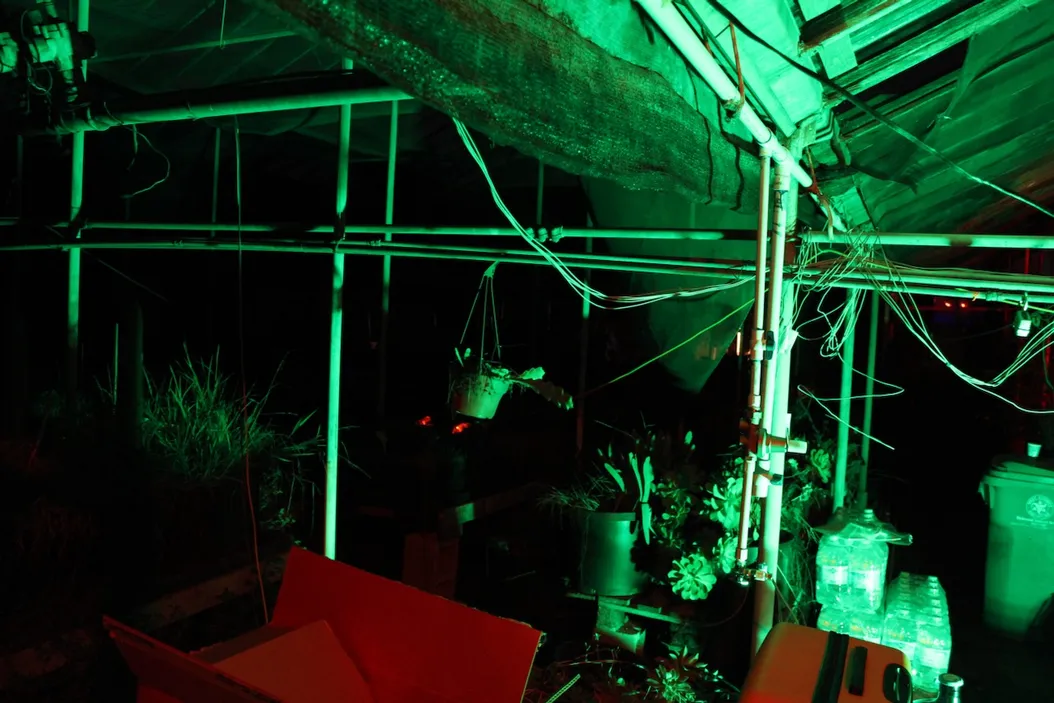〰️〰️ IN 〰️
These are things I read, saw, ingested, ate, listened to, or just generally thought about in the last month that I want to share with you. It's an incomplete list (obviously) but it's the stuff I'm still thinking about.
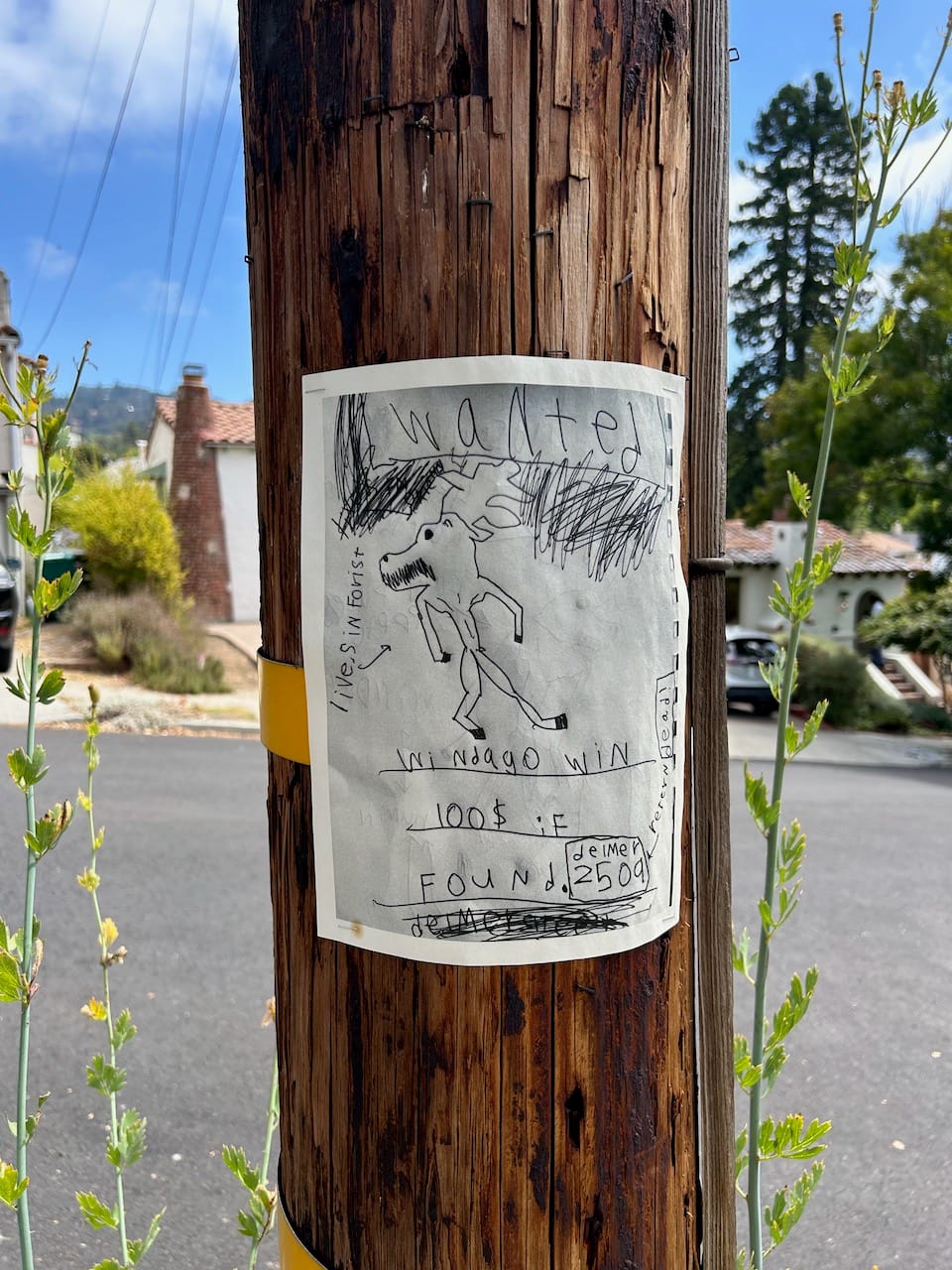
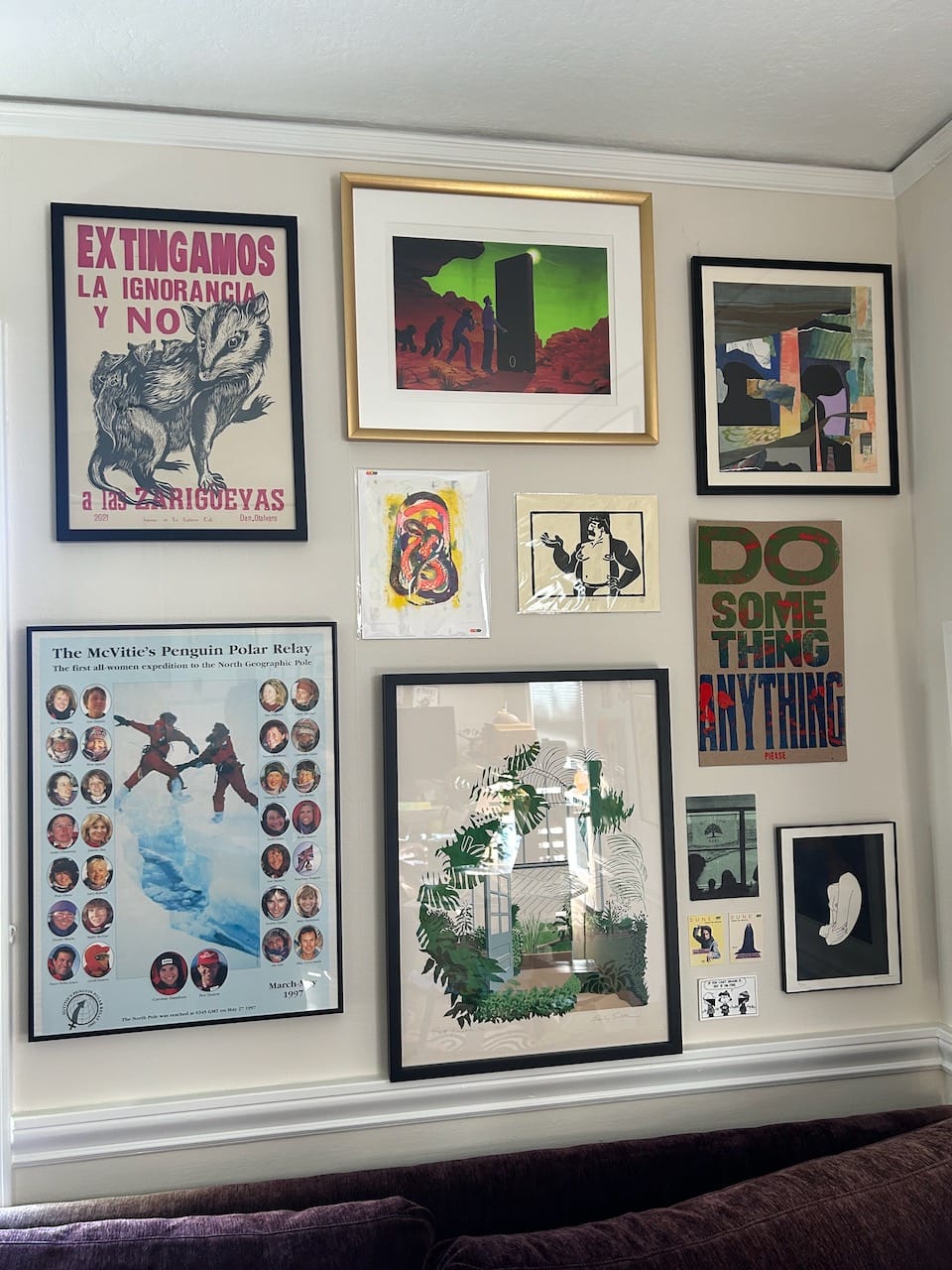
two kinds of art experiences
anatomy of a rabbit hole
In case you've ever wondered what it's like to live inside my brain, here's a pretty good picture in the form of a rabbit hole I fell down for a half a day:
For Under the Ice (aka PROJECT CUBENSIS) I was reading some old science journals from around the turn of the century to try and get some inspiration. There are some really incredible article titles, including things like: The Structure of the World-Stuff, The Trial of an Old Greek Corn-Ring, Some Further Comments on the Guatemalan Boll Weevil Ant, A Notable Advance in the Theory of Correlation, and, my personal favorite, Gossip About Lamarck.
But in that search, I came across a short letter to the editors of Science by someone named Jacques Loeb titled "Unauthorized Newspaper Reports," published in January of 1901.
In view of the fact that a number of daily papers have printed reports concerning alleged or real experiments of mine I wish to state:That none of the statements printed in the newspapers have been authorized by me.That whatever I may have to say about my work will be published in scientific journals.
Huh, I thought, I wonder what the papers were saying about this guy? So I went to a newspaper archive and looked him up. And, well, yeah, I get why he might have some feelings about these headlines.
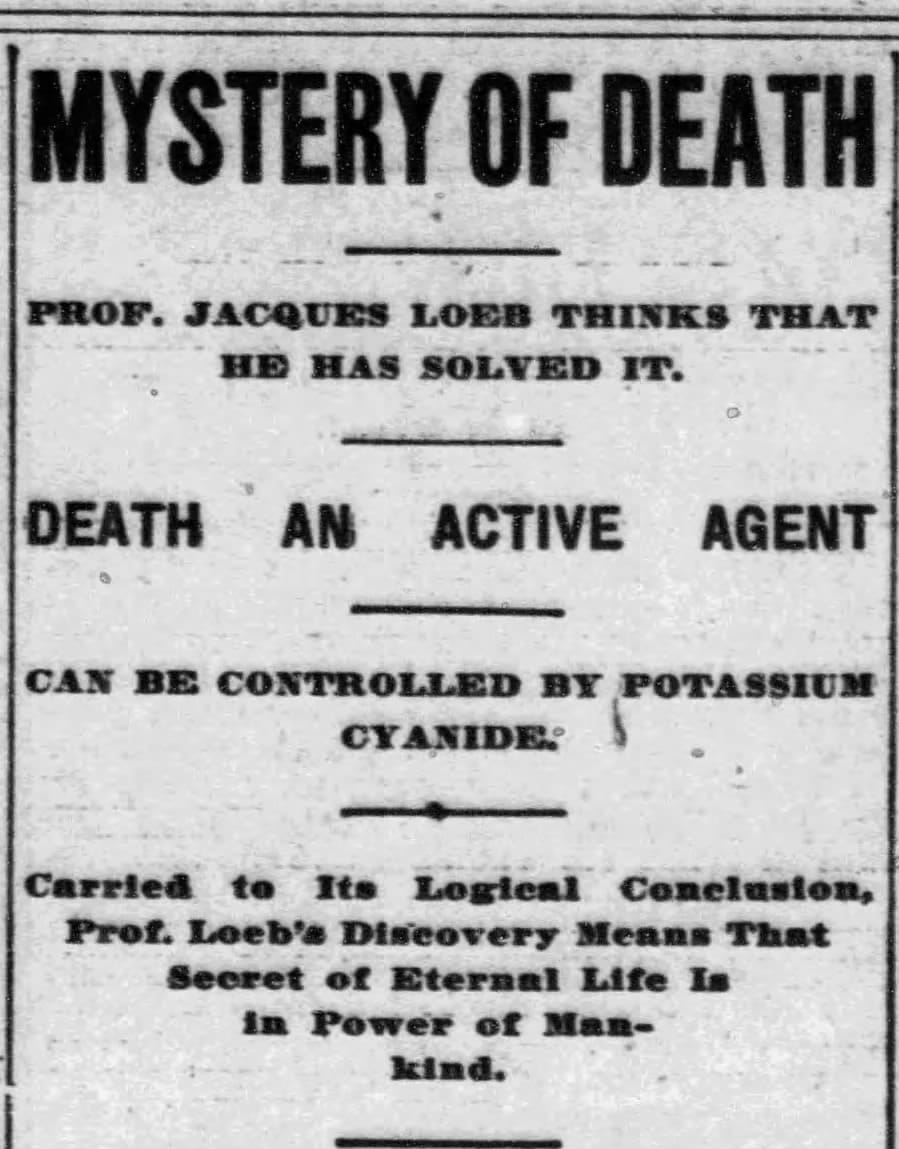
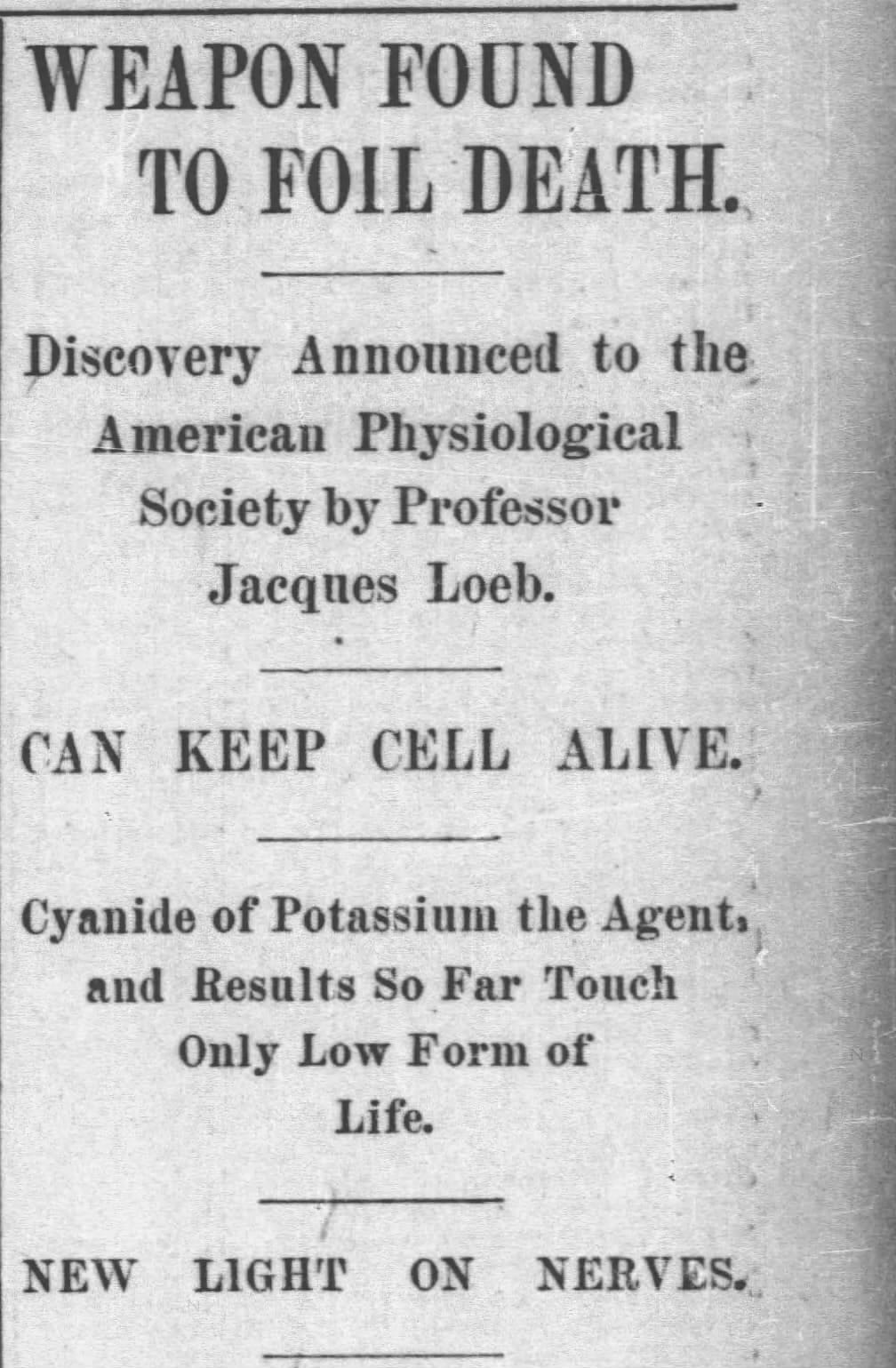
Which really made me wonder: who is this guy? So I read a bunch of obituaries and articles about him and his, apparently, incredibly important work on artificial parthenogenesis. "He sometimes explained his devotion to work by the whimsical remark that it was his pleasure, a kind of sport, an adventure in the unravelling of mysteries," writes W.J.V. Osterhout in one obituary.
Loeb's work ranged a huge number of subjects, in a way that modern scientists rarely have the luxury of. He studied animal instincts, the effect of ions on the body, parthenogenesis, and other bits and bobs in physiology. But one particular line in the Osterhout obituary caught my attention: his experiments on caterpillars.
Loeb's method of procedure is illustrated by his experiments on the caterpillars of Porthesia which issue from their winter nests and climb to the tips of the branches of trees where they find the opening buds which serve them as food. It was supposed that they found the right situation, in some cases before the food was actually ready, by a marvellous instinct. To explain the origin and the heredity of such an instinct might seem to require very complicated hypotheses. But Loeb brushed all this aside by a few simple experiments showing that these animals are slaves of the light. They climb upward toward the light until they reach the tips of the branches and there they remain. They act like photochemical machines to such an extent that if food is placed behind them when they are starving they are unable to turn their heads away from the light to take nourishment. It seemed possible that this effect might be produced by a photosensitive substance reacting more strongly on the illuminated side and hence (through the medium of the nervous system) affecting unequally the symmetrical muscles on the two sides so as to turn the head toward the light. To explain the heredity of such an "instinct" we need only suppose that the parent transmits to the offspring the ability to produce the photosensitive substance under the proper conditions.
One must therefore cease to speak of the will of this animal and regard it as a matter of mechanism, completely under the control of the experimenter. "The desire of the moth for the star" began to seem less mysterious.
I wanted to learn more about these experiments, so I searched for more on Loeb and Porthesia caterpillars and I learned two things:
- The Porthesia family seems to have been reclassified, taxonomically, to now be called Erebidae, and includes the swan moth which is very cool and weird looking.
- Loeb's work on caterpillars and the way in which they seek out the light has somehow percolated into a core Montesoori teaching philosophy.
“Sensitive Periods” is a term used in Montessori education. The term was originally coined by the scientist Hugo de Vries (a botanist) and connected the research by scientist Jacques Loeb (physiologist and biologist). Loeb studied butterflies and noticed that the larvae needed very specific leaves located at the top of the trees. They have a period of time when they are more attracted to light so they naturally climb towards the top of the trees and then eat those leaves. As they develop and no longer need that specific food, that attraction disappears. He concluded that this “sensitive period” for light literally saves the larvae’s life.
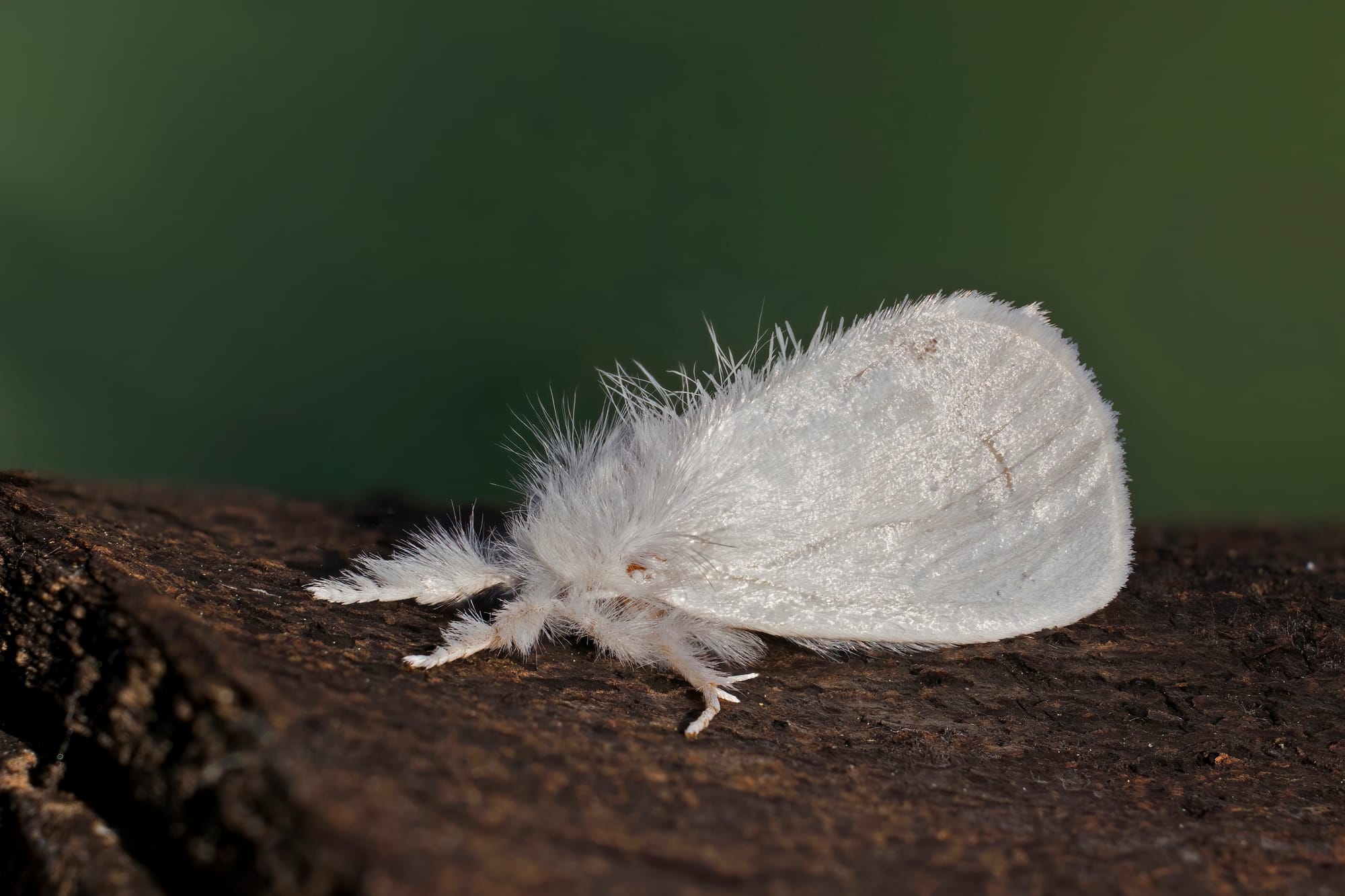
After all this, I finally opened the Wikipedia page for Loeb to see what else I might learn. And two sentences stood out:
- "He was the model for the character of Max Gottlieb in Sinclair Lewis's Pulitzer-winning novel Arrowsmith, the first great work of fiction to idealize and idolize pure science."
- Mark Twain also wrote an essay titled "Dr. Loeb's Incredible Discovery", urging the reader not to support a rigid general consensus, but to instead be open to new scientific advances.
Okay, I've never heard of Arrowsmith the novel before. What does it mean to be "the first great work of fiction to idealize and idolize pure science?" Other summaries of the book call it "the first scientific novel." I have to say, the plot summary includes some incredible lines such as: "He becomes engaged to one woman, cheats on her with another woman, becomes engaged to the second woman and then finally invites both women to a lunch to settle the issue.
The book was published in 1925, and in 1926 Lewis was awarded the Pulitzer Prize for it, which he rejected. Lewis told newspapers at the time that these kinds of awards were dangerous and that the result of them is that "every compulsion is put upon writers to become safe, polite, obedient and sterile." He also said that "it is not absurd to suggest that in another generation it may become the only thing for which any ambitious novelist will strive, and the administrators of the prize may become a supreme court, a college of cardinals, so rooted, and so sacred that to challenge them will be to commit blasphemy."
Declaring that only by regularly refusing the Pulitzer prize can novelists keep such an authority from being setup over them, he asked other writers to consider whether any prize "is worth that subservience."
I tried to find a copy but none of the public libraries I have cards at have it. But in reading about it I also learned that the book has some "harrowing" parallels to the COVID pandemic (which makes sense, given that the book was inspired at least in part by the 1918 influenza pandemic). "It takes what may be the only fate worse than dying in a pandemic to shock him into a direction, and it is left to readers to judge the merits of his choice, which in the end disappoints even Arrowsmith himself," wrote David J. Eisenman in JAMA in June of 2020.
Buried in the bottom of the Wikipedia entry for Arrowsmith is another incredible route to an amazing fact about the band Aerosemith:
“The members of the band reportedly spent afternoons getting high and watching Three Stooges reruns. One day, they had a post-Stooges meeting to try to come up with a name. Kramer said that, when he was in school, he would write the word "aerosmith" all over his notebooks. Initially, Kramer's bandmates were unimpressed; they all thought he was referring to the Sinclair Lewis novel they were required to read in high school English class. "No, not Arrowsmith," Kramer explained. "A-E-R-O...Aerosmith." The band settled upon this name after also considering "the Hookers" and "Spike Jones".
And then, in the final stop on our rabbit hole train, I went looking for the Mark Twain essay referenced in the Wikipedia page. Of course, it took me ages to find. If you search Mark Twain "Dr. Loeb's Incredible Discovery" what you will find is a huge pile of website quoting directly from Wikipedia and saying nothing else at all about the essay. Eventually I found a copy of it in the library archives from a book from 1988 that compiled Twain essays, so I could read the darn thing myself.
And, let's be honest here, it's not a very good essay. There's a reason it hasn't been reproduced much, and it's not easy to find. Twain kind of rambles through it, arguing that a lot of people in the past have been wrong about stuff, and so one shouldn't judge too quickly. Because you might be wrong. This is a logical fallacy of course, wrapping survivorship bias and confirmation bias up in a neat little package.
And that, friends, is how I spent a half day of my life. Cheating death, science novels, crappy Twain essays, beautiful moths, Montessori philosophy, and more.
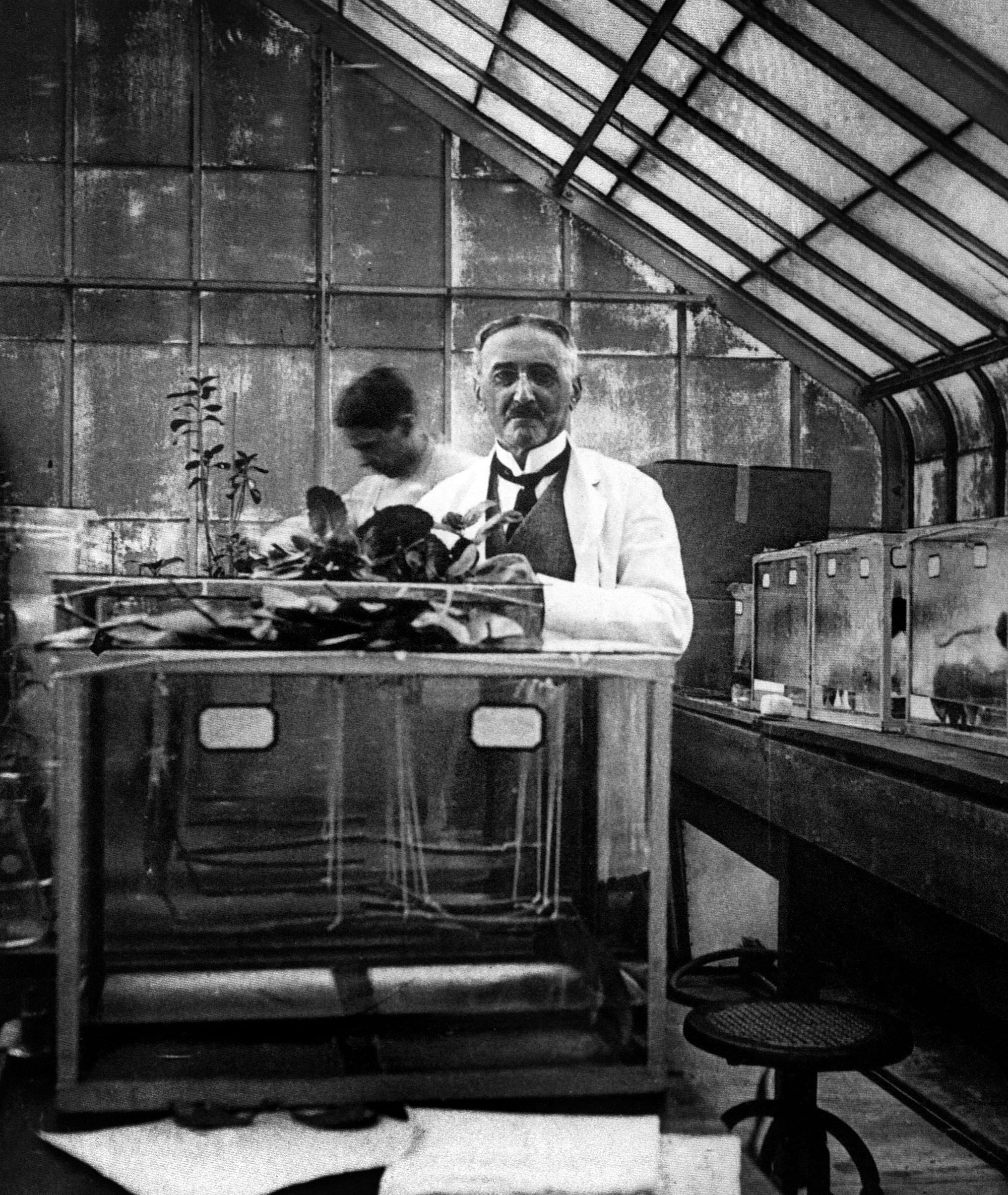
project TEONANACTL
I got notes back on a novella-ish length thing from my agent, who was honest with me that it wasn't quite working and that it's also VERY hard to sell that sort of thing. It's a bit of a bummer, because I was excited about it, but I'm going to take another crack at the draft whether I like it or not in September at the Banff Science Fiction residency which I somehow got into.
My agent and I agreed that the premise is cool, but the execution isn't quite landing. So I'm going to see if I can make it work better somehow and then we can tackle the fact that novellas simply do not sell unless you're already famous/published. Which is a bummer because I personally love a novella! I love short, tight work. But the publishing industry as it is isn't really interested in that length, and that's not something I personally can change. All I can do is make the work as compelling as possible. So I'm going to try to do that, and then we can assess what comes next.
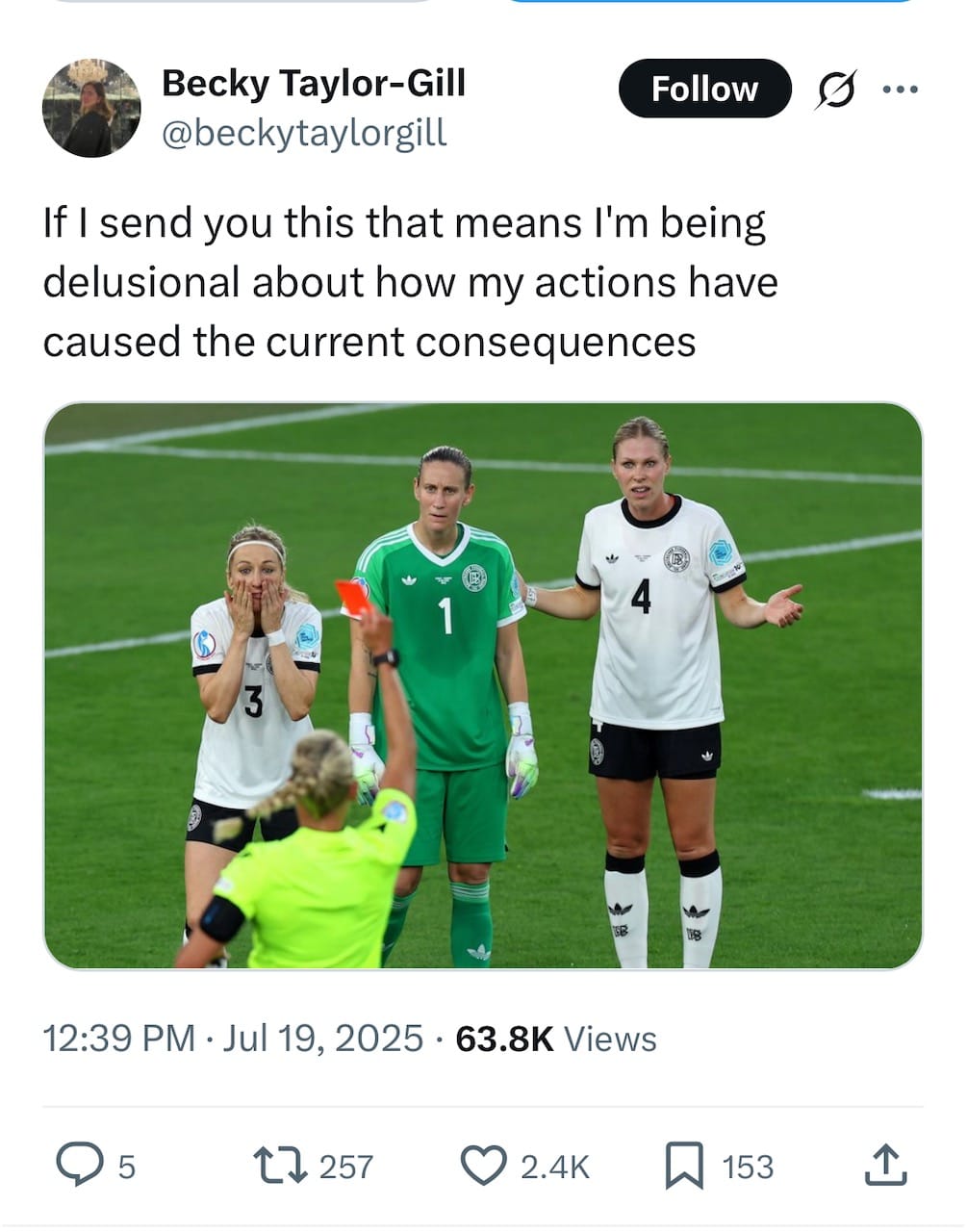
sports!
I did a lot of sports watching this month both on TV and in person. The Volleyball Nations League happened, as did the women's Euros and the Copa América Femenina. I went and saw both the Oakland Ballers (baseball) and the Oakland Spiders (ultimate frisbee) play games. I saw my beloved METS win agains the SF Giants. The WNBA is serving up some incredible storylines.
reading
- "We tend to think of memory and mind-related concepts as purely abstract, separate, and invisible processes that happen somewhere up there—at best in the brain, at worst in a separate "world of the mind" à la Descartes, entirely disconnected from the "physical world". Humble ants teach us otherwise." 〰️ Human Stigmergy
- "What else was I supposed to do in all those orphanages and sanatoriums? Every night before bed I’d tell the whole ward a scary story—the kind that makes people hold their breath, which is the only kind of story that people really listen to. Humor doesn’t cut it, or romance, or lyricism—no, no, no. Only terror works." 〰️ A fascinating, strange, and hilarious interview with Ludmilla Petrushevskaya.
- “The River House Broke. We Rushed in the River.” 〰️ I read this first person account of the recent Texas floods on the bus, which was a mistake because I cried the entire time (cw: death).
- “We just wanted to make an exciting, entertaining female heroine,” she says. “For God’s sake, sex and auto-insurance are not two things that go together.” 〰️ This interview with people who made porn out of Erin the Esurance cartoon is... incredibly funny.
- "It’s not that anyone ever outright says girls sports deserve less support, so much as that bureaucracy, local politics, funding struggles, and a lack of oversight can make securing a regulation field and enough time to play a whole game practically impossible." 〰️ Always read Maggie Mertens, and especially this piece on Title IX and women's sports.
- Simplicity by Mattie Lubchansky (so good!)
- Electric Noodle by Annalee Newitz (also so good!)
listening
- Mal Blum's new album is fun and also full of absolutely brutal lines. "You don't have friends you have meetings" really took me out. My favorite song on the album is The Truth is Out There.
- Wet Leg's new album is getting a lot of attention and I too am enjoying it! My favorite tracks are mangetout and 11:21.
- It's not new, but it is new to me: Saya Gray's album QWERTY has a lot of cool stuff going on.
- This song is weird but it hits a very specific neuron for me, so if you like weird bwa bwa computer music, this one is for you.
- My current bop of the moment.
〰️ OUT 〰️〰️
This is stuff I wrote, created, or published.
studio time
I spent some time in the studio this month, largely doing things that did not work (ah the joys of art). But the two things I can share that did work were:
- I cleaned my bench so that it's actually usable and no longer a fire hazard.
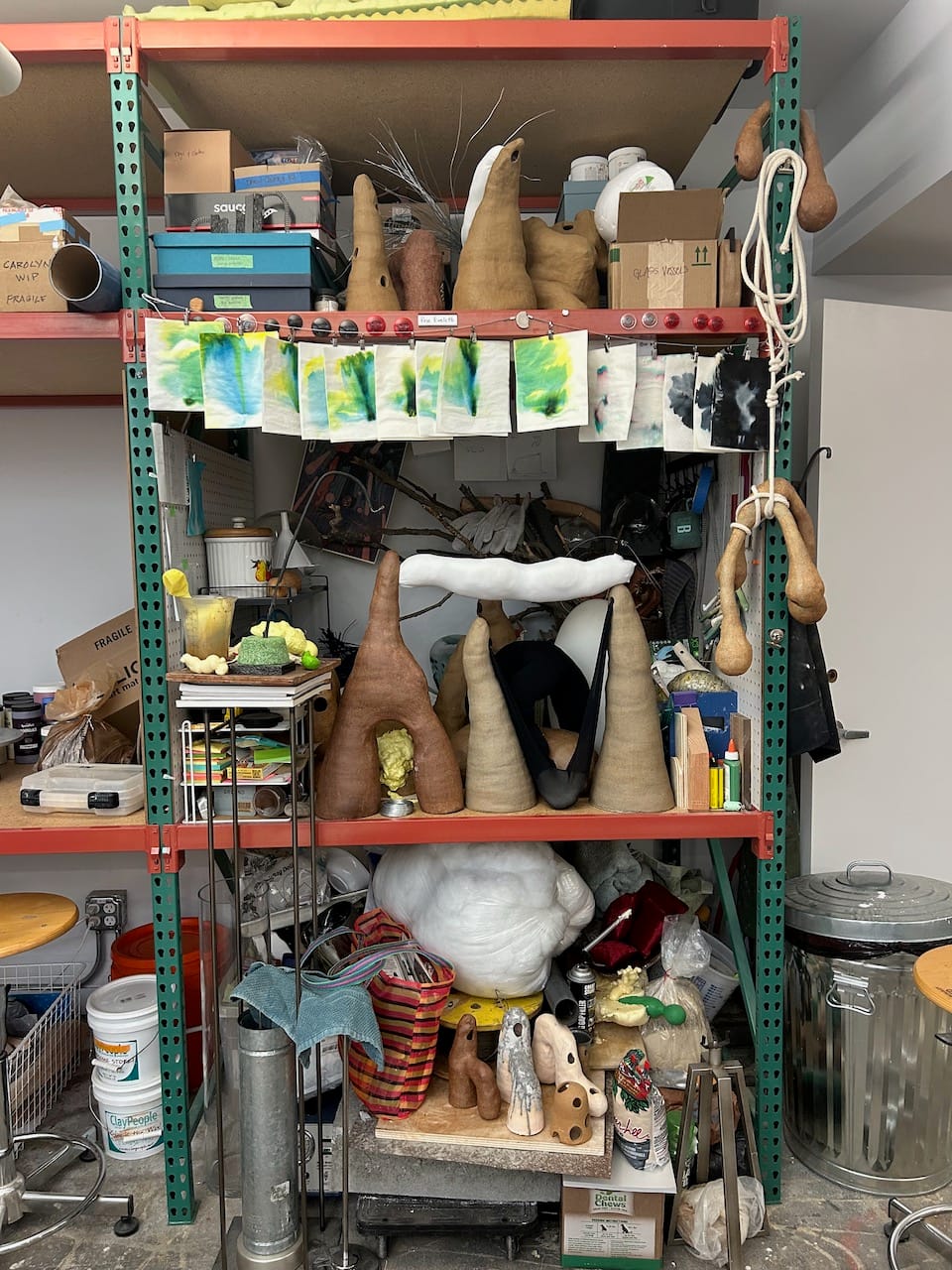
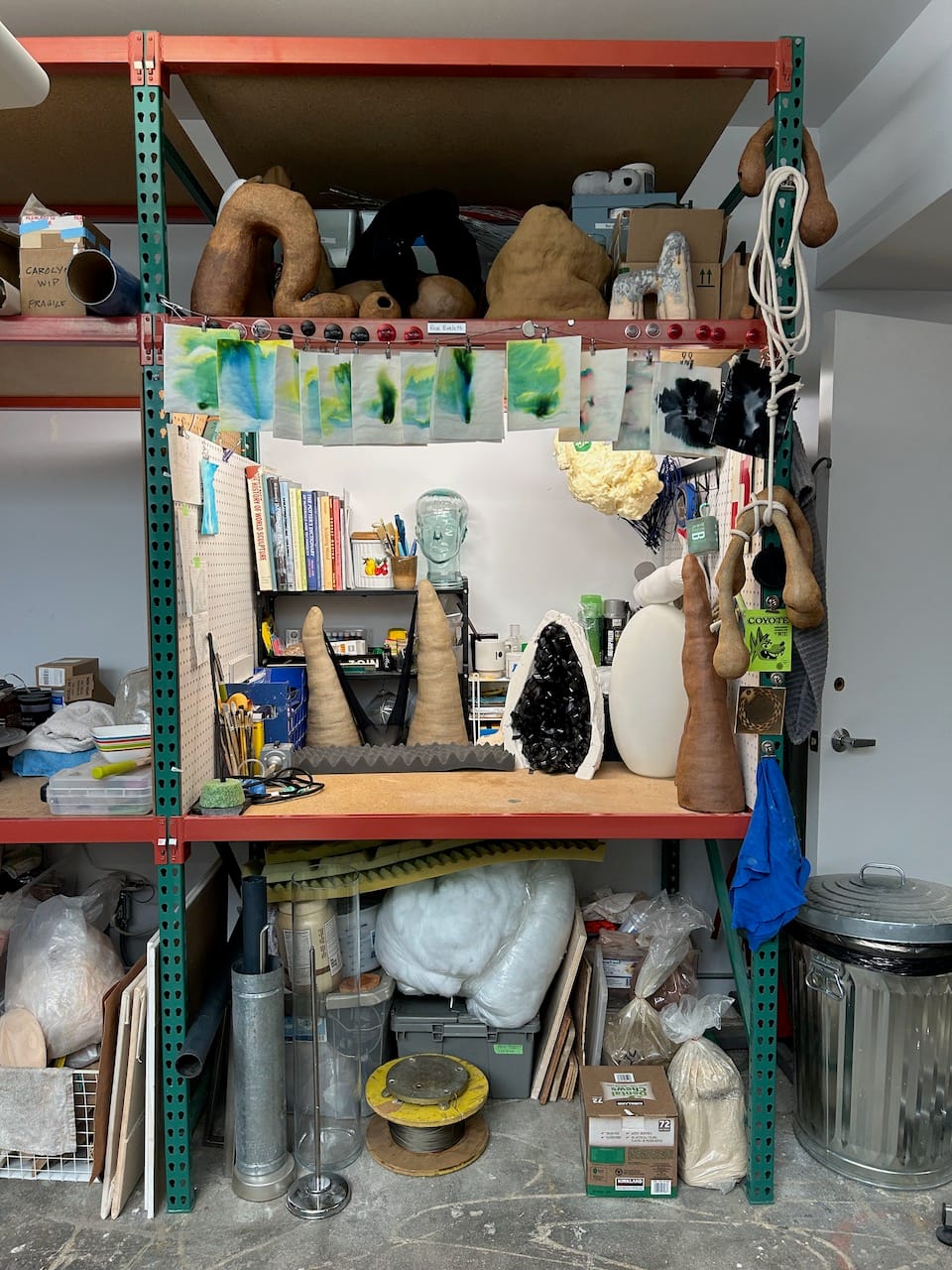
before (left) and after (right)
- I finished a piece in a series I'm working on. I'm still experimenting with how close I want the rock to be to the ground, and how far apart I want the two clay towers to be. But this is the gist!
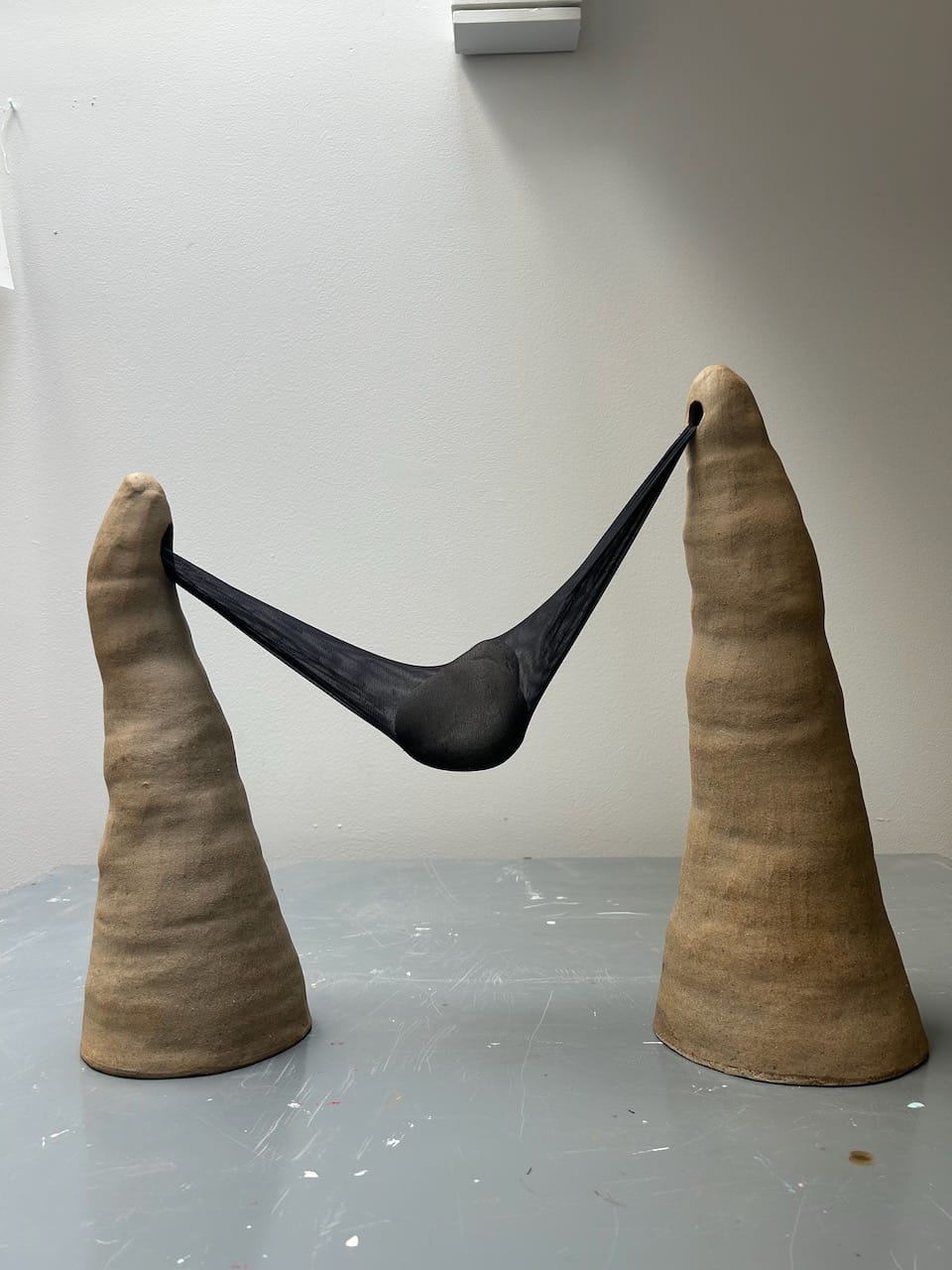
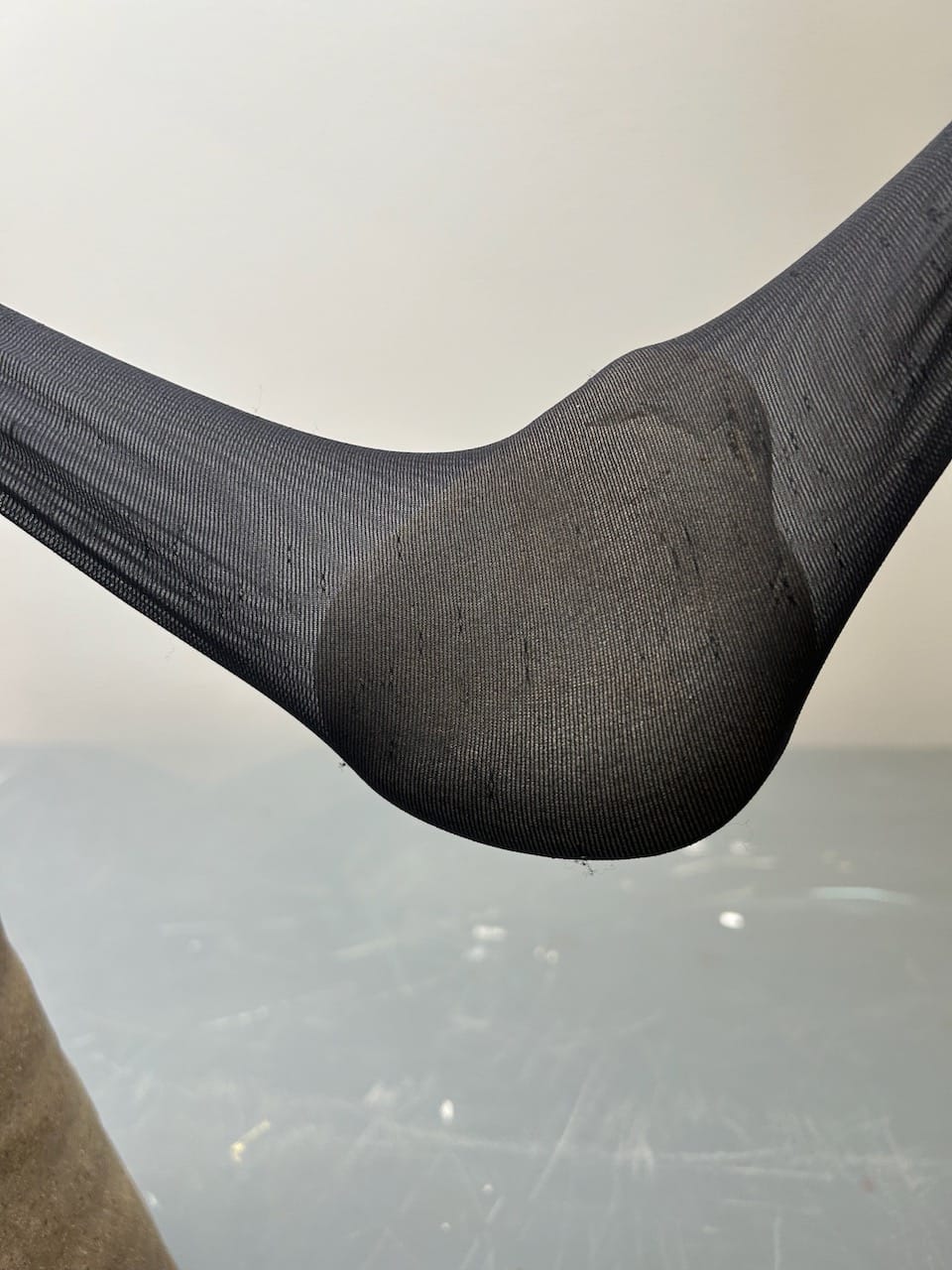
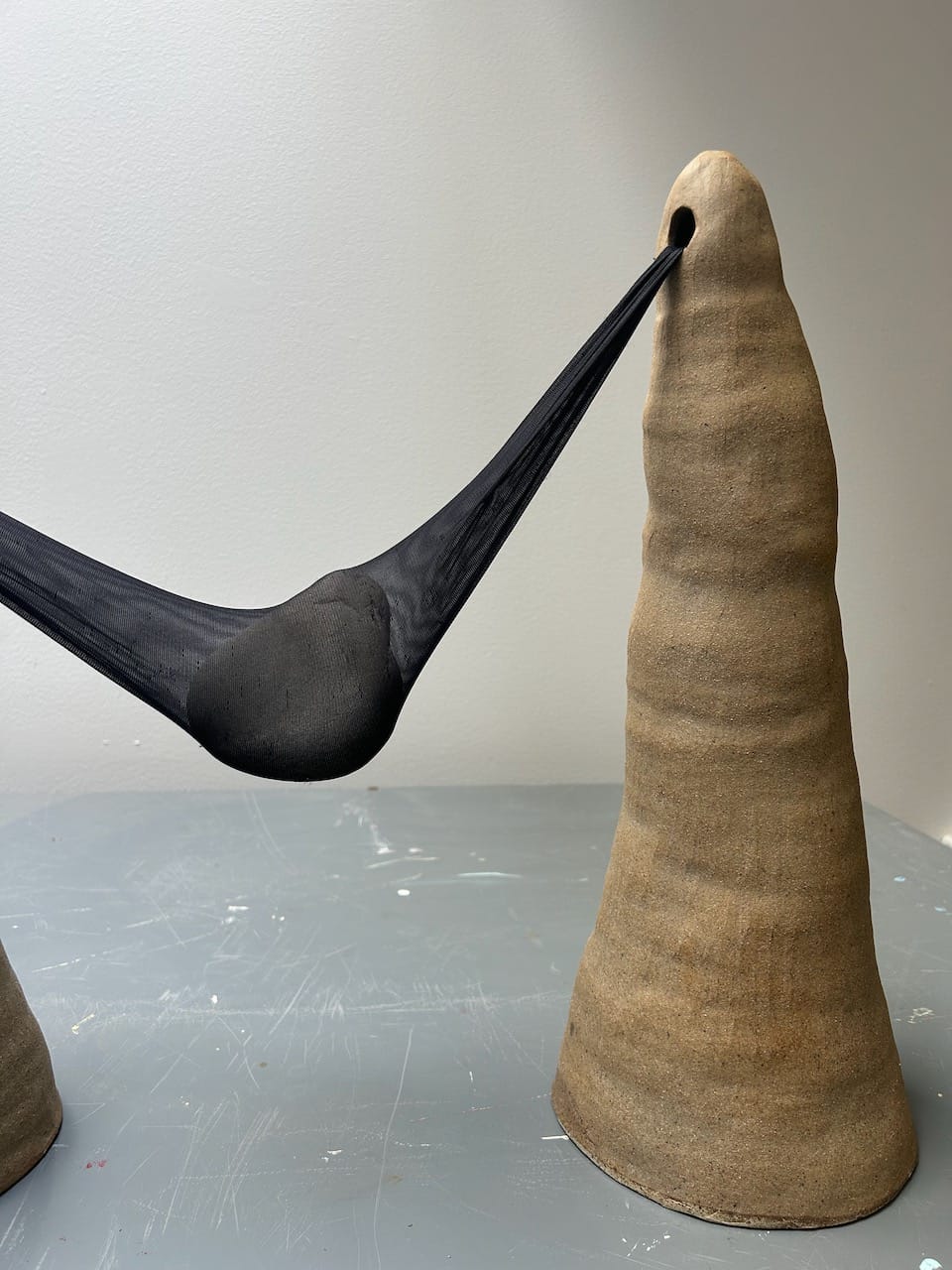
under the ice
Last in/out newlsetter I attempted to poll people on what to title a novel I'm working on. The poll didn't embed in the email, which is a good accidental way to test how many people are actually reading these because I got a bunch of messages telling me that it was not there. So here's the list again, this time no fancy poll:
- Under the Ice
- The Cold Place
- What Extraordinary Potential
- Breathing the Divine Afflatus
- The Honeyed Depths
- Sensitivity
- Before I Become A Ghost
- We Have Always Been Alone
Do you have any thoughts? What title grabs you most? I'm all ears.
More importantly, I finished a second draft! Most of the work on this round was trying to fix the plot itself — making the peripheral characters feel more real and impactful, making the narrative arc clearer and more direct, making motivations sharper. There's a funny thing in fiction, where it's important that the motivations of the characters are clear to the reader. But in real life, the motivations that any of us have are often not even clear to ourselves!
I wrote for paying subscribers about the struggle to get this draft done, and the meta-struggle of how much to push myself to power through it.
The draft I sent my agent needs work on the actual style and language pieces of things. But for this round I wanted to try and firm up the events, the timeline, the things people actually do to move the plot forward. I am still a little unsure about whether I solved the problems of the first draft, or just made new ones, but I'm hoping that I managed to do at least a little bit of column A (and, probably indeed a little bit of column B too).
Now I wait for notes back, which means I'm jumping to a different project for August: my non-fiction book proposal. I'll write more about that in this month's subscriber newsletter, and you'll hear a bit about it in the August in/out.
coyote
I've spent about twenty-five hours a week working on a ton of back-end stuff for COYOTE this month. It's not glamorous work. Making and organizing documents, thinking through paywall strategies, coordinating meetings, creating processes and structures, reviewing legal documents, writing policies, wrangling freelancers and schedules, crunching budget numbers, pricing out vendors, the list goes on and on. Starting a business is hard. Starting a publication is hard. Starting a worker owned independent media cooperative is... very hard. I owe so many people emails right now. If that's you... sorry.
But! The exciting thing is that the site has an official launch date. SEPTEMBER 15th!! You can become a subscriber here.
I also
- Was in conversation with Agustín Fuentes about his new book Sex Is a Spectrum: The Biological Limits of the Binary.
- Helped write and shepherd updates on the Unbreaking Trans Healthcare page. (It's bad.)
- Wrote to you all about June's in/out.
- Wrote a post about when to push yourself and when to take a break.
- Got a vintage candy dispenser, and am now fighting with my partner about what to put in it. (He says candy, I say googley eyes, friends say we should compromise with candy googley eyes.)
- Poured some concrete to make bases for some metal stands I got from a guy whose neighbor "borrowed" the metal from the Bay Bridge when it was under construction.
- Finished stripping and repainting a cool cabinet that we got for cheap.
- Got some new hoyas (my count is now 45, it's not a problem, I promise).
- Hung up all my art in my office in a gallery wall.
- Made a couple of small ceramic pieces that I'm going to wood fire later this month in the kiln I helped build.
A shorter newsletter this month! By a little. I'm working on it okay?
